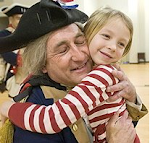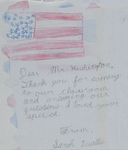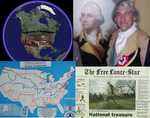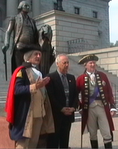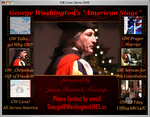
George Washington is so little taught in the modern public schools,
despite where by law passed by Congress in the 1950s, a picture of George Washington is to appear in the school if the school is to continue to receive federal funds,
and despite the fact that in 1982, President Reagan said,
"The most sublime picture in American History is of George Washington on his knees..."
and sadly, where now George Washington is too often vilified as a "brutal slaveholder"
by some teachers despite his unreported actions to bring an end to slavery,
...his letters to all the governors after the War for Independence to give emancipation and a plot of land to blacks who fought for America's liberty, and nine of 13 did so,
...his own efforts to have his people leave Mount Vernon to earn a living, land, and Liberty on his lands in the Ohio Territory,
...and including his personal example of freeing his slaves in his Last Will and Testament,
while his heirs provided a non-government funded pension plan for the aged and infirmed for over 33 years!
Yet all this and more is ignored, while Lincoln is deified by professors and educators as the "Great Emancipator",
so sometimes students try to taunt me with the question,
"What do you think of Lincoln?" with emphasis on "LINCOLN".
I reply,
"Lincoln? Lincoln was a great patriot. I thought so much of Lincoln that I named him to receive the surrender of the British at Yorktown!"
When they look at me dumbfounded, I continue.
"Yes, my close friend, Major General Benjamin Lincoln, my number two, my second in command."
"You look confused. Did you mean Levi Lincoln, Attorney General to President Jefferson?"
"Or the man who in 1867, patented the "Wheel of Life", or the motion picture camera, William Lincoln?"
"Or did you mean the man who invented the Lincoln automobile, Henry Selden? Henry was the son of George Seldon, who said no to Abraham Lincoln when he was asked to be Vice President in the election of 1864, and so would have become President when Lincoln died."
But that begs the true history question, "Who killed Lincoln?"
Have you been taught "Southern sympathizer and actor John Wilkes Booth"?
It is true Booth shot Lincoln (President, not General Lincoln), but likely Booth did not kill Lincoln.
What is the Truth, the Whole Truth, and Nothing but the Truth, So Help Me God, as a witness pledges in court under Oath?
The muzzle velocity of Booth's small gun was about the same as a modern CO2 pellet gun, the bullet did not have the force to exit the skull on the far side, so the bullet remained in the brain.
Is that the definition of a "splitting headache"?
An American Heritage magazine article years ago did an excellent study detailing the many soldiers who lived for decades who got shot but lived with minnie balls and much larger bullets in the brain.
The little bullet in Lincoln's brain did not kill him, the doctors who time after time stuck their fingers, pencils, and other tools into the wound and into Lincoln's brain killed him.
With their trying unsuccessfully to extract the small bullet, the doctors killed Lincoln by consequently causing the fluids to drain away rather than the body to seal the wound and begin the process of healing, and by filthy fingers introducing septic shock from infections.
John Wilkes Booth only shot Lincoln with a small size bullet. Lincoln likely may have survived based on the experience of soldiers who survived bullets in the brain in "Mr. Lincoln's War", the War Between the States.
And remember the story of someone who later asked the deceased president's wife, Mary Todd Lincoln, about her recollections of the performance that night at the Ford's Theater:
"So Madam, how did you enjoy the show?" or words to that effect.
Congress later declined to provide Mrs. Lincoln a widow's pension, some saying she was involved in one way or another with the assassination. Earlier, during the war, opponents claimed she was a southern sympathizer, and in a surprise appearance before the Committee on the Conduct of the War of the Congress, President Lincoln personally testified on behalf of her loyalty.
Her eldest son Robert had her legally committed to an insane asylum in Batavia, Illinois in 1875 to gain control of the family estate. She considered Robert's action a betrayal, and never forgave her son by the time she died in Springfield, Illinois in 1882.
(Write me with comments to include the exact quote to Mrs. Lincoln and your source, or other information about Mrs. Lincoln after Lincoln died.)
And all across America, at the Presidio of San Francisco, which was first established in 1776 under the Flag of Spain, Mexico in 1822, and the came under the Flag of the United States in 1848, when Abraham Lincoln served his one term as a United States Congressman from Illinois elected in 1846, and on July 4th, 1848 spoke on the rights of the states to secede and form a Confederacy, but he was referring to the right of the northern states to secede and form a Northern Confederacy in protest to the War with Mexico and the admission of Texas as a state.
Wistfully Lincoln wished John Quincy Adams could have served as his Confederacy's first President, but Adams had died earlier that year on the day after George Washington's Birthday, on 23 February. John Quincy Adams had a son who he named George Washington Adams, as John Hancock named a son George Washington Hancock, and General LaFayette, a hero along with General Lincoln at Yorktown, named his son George Washington LaFayette, and his daughter "Virginia".
And so as America's favorite radio commentator Paul Harvey says,
"And now, for the rest of the story."
In view of the Golden Gate Bridge on t
 he Presidio of San Francisco two streets intersect, Washington and Lincoln, named not for the Presidents, but for General Washington and General Lincoln.
he Presidio of San Francisco two streets intersect, Washington and Lincoln, named not for the Presidents, but for General Washington and General Lincoln.


